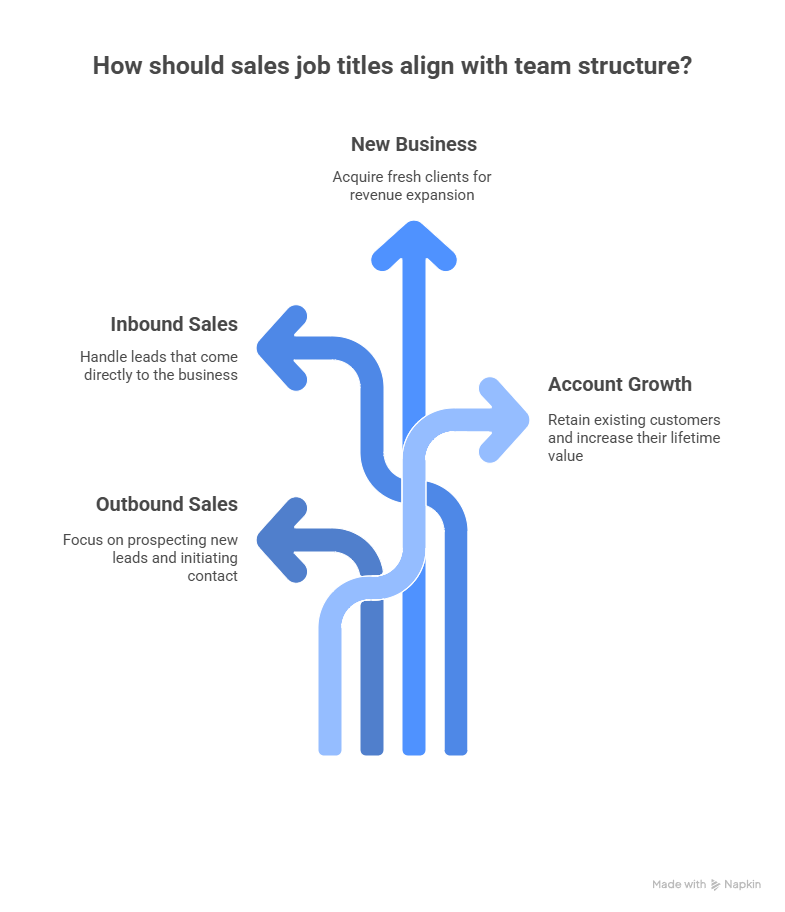Sales job titles can be confusing, especially when roles and responsibilities often overlap. From entry-level positions like Sales Associate to leadership roles such as Vice President of Sales, each title reflects a specific function within the sales process. Understanding these titles helps you identify the right talent or position for your business needs.
Whether you’re building a sales team or exploring career opportunities, knowing what each role entails is essential. Titles often indicate experience level, specialization, and focus areas like inside sales, outside sales, or account management. This clarity ensures better alignment between goals and expertise.
Are you ready to discover how these roles impact revenue growth and which ones could drive success for your business? Keep reading to find out.
What Are Sales Job Titles?
Sales job titles define roles, responsibilities, and career progression within an organization. They reflect experience levels, areas of specialization, and hierarchical structure in sales teams.
Why Job Titles Define Roles and Hierarchy in Sales?
Job titles establish clarity by outlining specific functions and team hierarchy. For example, entry-level job titles like “Sales Representative” focus on prospecting and lead generation, while senior job titles such as “Regional Sales Manager” involve overseeing teams and driving strategy. Clear role definitions reduce overlap in responsibilities and improve operational efficiency.
Titles also align with organizational structure. Leadership titles like “Vice President of Sales” signify strategic oversight across regions or divisions. Specialist roles such as “Account Executive” or “Business Development Manager” highlight expertise in client acquisition or relationship management. This structured approach ensures accountability at all levels.
The Role of Job Titles in Recruiting and Career Growth
Job titles attract the right talent during recruitment by signaling expectations and growth opportunities. Candidates seeking a career path in sales often assess job title hierarchy to evaluate potential for advancement. For instance, professionals may progress from “Inside Sales Associate” to “Senior Account Manager,” then to leadership positions like “Director of Sales.”
For sales remote staffing or global hiring initiatives, standardized job functions simplify the hiring process across distributed teams. Emerging job titles such as “Remote Sales Consultant” cater to evolving workforce needs. Accurate titling supports professional growth by providing employees with clear benchmarks for promotion within their career ladder.
The Sales Job Title Hierarchy
Sales job titles define career progression, clarify responsibilities, and establish team structure. Understanding the hierarchy helps you align roles with organizational goals and recruit effectively for remote sales teams.
Entry-Level Sales Roles
Entry-level sales roles focus on lead generation, customer outreach, and administrative support. These positions are ideal for individuals starting their career path in sales.
Sales Development Representative (SDR)
As an SDR, your primary responsibility is prospecting potential clients through cold calls or emails. You qualify leads before passing them to account executives. This role emphasizes pipeline building over closing deals.
Business Development Representative (BDR)
A BDR identifies new business opportunities by researching markets and nurturing relationships with prospects. Unlike SDRs, BDRs often target long-term partnerships or enterprise accounts.
Inside Sales Associate
Inside sales associates handle inbound inquiries and close smaller deals remotely. They use CRM tools like Salesforce to track interactions and manage client communication efficiently.
Sales Coordinator
In this role, you provide administrative support to the sales team by preparing reports, scheduling meetings, and maintaining records. Coordinators ensure smooth operations within the department.
Mid-Level Sales Roles
Mid-level roles involve managing client relationships, overseeing territories, or optimizing processes. These positions require experience in handling more complex job functions.
Account Executive (AE)
Account executives manage client accounts from initial contact to deal closure. You negotiate contracts while meeting revenue targets set by leadership teams.
Territory Sales Manager
Territory managers oversee specific geographic regions. Your tasks include setting quotas for local reps and ensuring consistent performance across assigned areas.
Channel Sales Manager
Channel managers develop partnerships with resellers or distributors to expand market reach. Success depends on creating mutually beneficial agreements that drive revenue growth.
Customer Success Manager
Customer success managers focus on post-sale engagement by improving retention rates and upselling additional services. You act as a liaison between customers and internal teams to resolve issues quickly.
Sales Operations Analyst
This role involves analyzing data trends to improve efficiency within the sales process. Analysts recommend strategies based on metrics like conversion rates or average deal size.
Senior Sales Roles
Senior roles combine strategic oversight with mentoring responsibilities to scale business impact through effective leadership practices.
Regional Sales Director
Regional directors supervise multiple territories within a defined area. You carry out high-level strategies while monitoring regional KPIs such as profit margins or customer acquisition costs.
Enterprise Account Executive
Enterprise AEs specialize in securing large-scale contracts with major corporations. Negotiations often involve multi-stakeholder discussions requiring advanced interpersonal skills.
Head of Sales Operations
The head of sales operations optimizes workflows across departments using tools like HubSpot or Tableau for better decision-making processes at scale.
Sales Enablement Manager
Enablement managers equip teams with training programs tailored toward achieving higher productivity levels during each stage of the buyer’s journey.
Executive Sales Roles
Executive titles reflect top-tier leadership focused on driving overall company growth through innovative strategies aligned with global objectives.
Chief Sales Officer (CSO)
As CSO, you’re responsible for shaping long-term revenue plans while collaborating closely with C-suite peers like CFOs or CMOs during quarterly reviews targeting sustainable expansion goals globally.

Specialized and Emerging Sales Titles
Specialized and emerging sales titles reflect the changing needs of businesses, particularly in remote staffing for US companies. These roles address specific challenges in scaling teams, optimizing processes, and driving revenue growth.
Revenue Operations (RevOps) Manager
A RevOps Manager aligns sales, marketing, and customer success to streamline operations. This role focuses on data analysis, CRM management, and process optimization to improve efficiency across departments. For example, a RevOps Manager might carry out automated workflows that reduce lead response times by 30%.
In remote recruitment scenarios, this position ensures seamless collaboration between distributed teams. Companies seeking scalable solutions benefit from hiring professionals with expertise in operational alignment.
Sales Enablement Specialist
A Sales Enablement Specialist equips your team with resources to close deals effectively. They create training programs, develop content like pitch decks or case studies, and manage tools such as Gong or Outreach.io to track performance metrics.
This role is critical for onboarding remote employees quickly while maintaining productivity standards. If you’re building a nearshore or offshore sales team, enablement specialists ensure consistent messaging and skill development across locations.
Customer Success Director
Customer Success Directors oversee client retention strategies by ensuring satisfaction post-sale. They monitor KPIs like churn rates or Net Promoter Scores (NPS) while identifying upsell opportunities within existing accounts.
For remote-first organizations serving global clients, this title bridges cultural gaps through proactive engagement strategies tailored to diverse markets. Hiring someone skilled in relationship management strengthens long-term partnerships essential for recurring revenue models.
Partnership Manager
Partnership Managers focus on building alliances that expand market reach or complement service offerings. Their responsibilities include negotiating contracts with affiliates or resellers and managing co-marketing initiatives that drive mutual growth.
When scaling remotely, partnership managers identify strategic collaborators who can amplify your brand presence without increasing overhead costs. Tools like PartnerStack simplify tracking partner contributions and ROI.
Growth Account Manager
Growth Account Managers specialize in expanding relationships within key accounts by identifying cross-sell or upsell opportunities aligned with client goals. They analyze account health using platforms like Gainsight to recommend tailored solutions that increase value delivery.
This role supports business expansion efforts when operating distributed teams by focusing on high-value customers who contribute significantly to overall revenue targets. Employing experienced growth managers accelerates professional progression within your organizational structure while maximizing profitability potential across workforce roles globally.

How Sales Job Titles Align With Team Structure
Sales job titles reflect the hierarchy and functional roles within a team. They clarify responsibilities, streamline workflows, and support organizational goals.
Outbound vs Inbound Sales Functions
Outbound sales roles focus on prospecting new leads and initiating contact with potential clients. Examples include Business Development Representatives (BDRs) and Outbound Sales Specialists. These positions require proactive outreach through cold calls, emails, or social media to generate interest in your offerings.
Inbound sales roles handle leads that come directly to your business via marketing efforts like website inquiries or content downloads. Positions such as Inbound Sales Representatives or Inside Sales Executives manage these opportunities by nurturing relationships and converting warm leads into customers. Structuring teams around these functions ensures better lead management and higher conversion rates.
New Business vs Account Growth Roles
New business roles concentrate on acquiring fresh clients for revenue expansion. Common job titles include Account Executives (AEs) and Enterprise Sales Managers. These professionals negotiate contracts, close deals, and build initial client relationships.
Account growth roles prioritize retaining existing customers while increasing their lifetime value. Customer Success Managers (CSMs), Key Account Managers, and Growth Account Managers work to upsell services, renew contracts, or cross-sell products. Balancing these distinct focuses within your team structure enhances both acquisition efforts and long-term customer loyalty.
Why Clear Sales Titles Improve Pipeline and Forecasting
Defined sales titles reduce ambiguity in role expectations across your team. For example, separating SDRs from AEs clarifies who generates leads versus who closes deals. This segmentation improves pipeline visibility by assigning specific metrics to each position.
Clear titles also enhance forecasting accuracy by aligning individual contributions with overall sales goals. Leadership can track performance more effectively when every title corresponds to measurable outcomes like lead volume or deal size. This clarity supports better decision-making for resource allocation in remote staffing models or global hiring strategies where distributed teams operate across time zones.
In Sales, Titles Reflect Quotas — Do You Have the Team to Hit Yours?
Understanding sales job titles goes beyond semantics; it’s about building a team that aligns with your goals and drives measurable results. Each title represents a specific function within the revenue engine, ensuring every role contributes to organizational success.
Whether you’re scaling your business or refining your existing structure, having clarity in roles is essential for efficiency and growth. By leveraging specialized talent and aligning responsibilities with strategic objectives, you set the foundation for sustainable performance.
As markets evolve and remote work becomes standard, sourcing top-tier professionals who fit seamlessly into your organization is more critical than ever. With the right team in place, you’re better positioned to meet quotas, exceed expectations, and achieve long-term success.
Ready to build a strong sales team? Book a Strategic Call with Our Sales Recruiters

Frequently Asked Questions
What are the main levels of sales job titles?
Sales job titles typically fall into four categories: entry-level, mid-level, senior-level, and executive roles. Entry-level positions include Sales Development Representatives (SDRs) and Business Development Representatives (BDRs). Mid-level roles involve Account Executives and Territory Sales Managers. Senior positions include Regional Sales Directors and Enterprise Account Executives, while executive roles like Chief Sales Officer (CSO) focus on company-wide strategy.
Why is understanding sales job titles important?
Understanding sales job titles helps businesses identify the right talent for specific needs and allows professionals to explore career opportunities effectively. Clear titles define responsibilities, align goals with expertise, and streamline workflows within organizations.
How do specialized sales roles benefit businesses?
Specialized sales roles like Revenue Operations Manager or Customer Success Director optimize processes, improve revenue growth, and address evolving business needs. These roles are particularly valuable in remote work environments where clear specialization ensures efficiency.
What’s the difference between outbound and inbound sales roles?
Outbound sales roles focus on prospecting new leads through cold outreach methods like calls or emails. Inbound sales roles manage leads generated by marketing efforts, nurturing them into customers through personalized engagement.
How do clear sales job titles improve team performance?
Clear job titles reduce ambiguity in role expectations, making it easier to track performance metrics, allocate resources efficiently, and ensure accountability across teams. This clarity is especially crucial for remote staffing models.
What does Scale Army specialize in?
Scale Army specializes in connecting businesses with pre-vetted remote sales professionals from diverse regions such as LATAM, North Africa, and Eastern Europe. They provide top-tier talent tailored to organizational goals through rigorous screening processes.
Which key roles does Scale Army help recruit for?
Scale Army focuses on hiring essential sales positions like SDRs (Sales Development Representatives), Account Executives, RevOps Managers (Revenue Operations), and other specialized roles that drive revenue growth for businesses globally.
Why are emerging sales titles becoming more common?
Emerging sales titles reflect the changing workforce trend and the need for specialized skills in areas like customer success, partnerships, or revenue operations. These new roles support modern business strategies focused on optimization and scalability.
How do structured hierarchies impact a company’s success?
Structured hierarchies clarify responsibilities at each level of a team—entry-level employees handle lead generation tasks while senior staff oversee strategy. This alignment ensures accountability while supporting long-term organizational goals.
Why should companies consider hiring remote sales professionals?
Remote staffing offers access to global talent pools with diverse expertise while reducing overhead costs. It also enables flexibility across time zones to maintain continuous productivity in any fast-paced business environment.
How Scale Army Helps Companies Hire Sales Talent
Scale Army specializes in connecting businesses with top-tier remote sales professionals. Its approach focuses on efficiency, expertise, and long-term value for revenue teams.
Global Access to Pre-Vetted Sales Professionals
Scale Army provides access to a global pool of pre-vetted sales talent. Candidates undergo rigorous screening processes that assess their skills, experience, and cultural fit. This ensures you hire professionals who align with your organizational goals. By sourcing from diverse regions, Scale Army helps companies overcome local hiring limitations while maintaining high-quality standards.
Pre-vetted roles include SDRs, Account Executives, and RevOps Managers. These functional roles are critical for driving business growth through lead generation, client management, and operational optimization. With this model, you save time during the hiring process and reduce turnover risks by onboarding qualified candidates ready to contribute immediately.
Expertise in SDRs, Closers, Account Managers, and RevOps
Scale Army excels at recruiting specialists across key sales job categories. Entry-level job titles like SDRs focus on outbound prospecting and nurturing leads. Closers handle advanced negotiations to convert prospects into clients. Account Managers maintain relationships with existing customers to maximize retention rates.
RevOps professionals optimize workflows within your team structure by aligning tools and strategies across departments. Their expertise improves forecasting accuracy and streamlines operations for scalable growth. Hiring these specialized roles enhances your workforce structure while addressing gaps in your company hierarchy.
Talent Sourced From LATAM, North Africa, and Eastern Europe
Scale Army taps into talent pools in Latin America (LATAM), North Africa, and Eastern Europe to deliver cost-effective recruitment solutions without compromising quality. These regions offer skilled professionals fluent in English with strong cultural adaptability for US-based businesses.
Nearshore recruitment from LATAM supports real-time collaboration due to overlapping time zones. Offshore staffing from North Africa or Eastern Europe provides access to highly educated candidates experienced in global markets. This geographic diversity strengthens distributed teams while meeting budget constraints.
Long-Term Hires Embedded Into Revenue Organizations
Scale Army prioritizes embedding hires into your revenue organization as integral team members rather than temporary contractors. This approach fosters loyalty and professional growth among employees while ensuring alignment with long-term business objectives.
Embedded workforce models improve team cohesion by reducing employee churn common in short-term staffing arrangements. Over time, these hires develop deep knowledge of your products, services, and customer base—enhancing overall performance metrics like pipeline velocity or deal closure rates.




